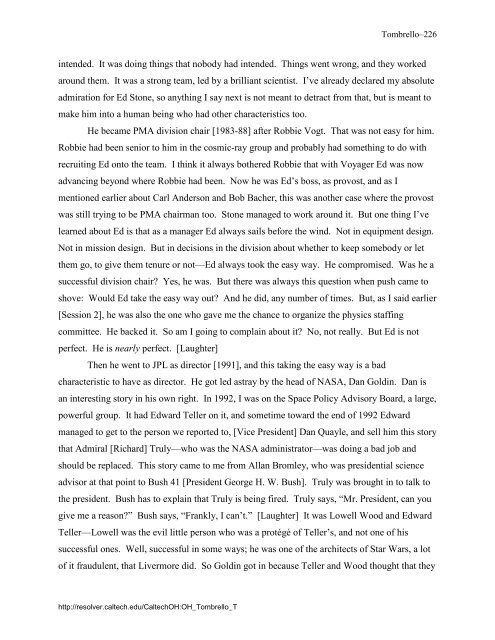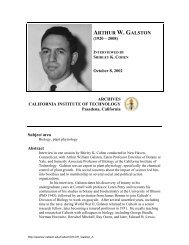Interview with Thomas A. Tombrello - Caltech Oral Histories
Interview with Thomas A. Tombrello - Caltech Oral Histories
Interview with Thomas A. Tombrello - Caltech Oral Histories
You also want an ePaper? Increase the reach of your titles
YUMPU automatically turns print PDFs into web optimized ePapers that Google loves.
<strong>Tombrello</strong>–226<br />
intended. It was doing things that nobody had intended. Things went wrong, and they worked<br />
around them. It was a strong team, led by a brilliant scientist. I’ve already declared my absolute<br />
admiration for Ed Stone, so anything I say next is not meant to detract from that, but is meant to<br />
make him into a human being who had other characteristics too.<br />
He became PMA division chair [1983-88] after Robbie Vogt. That was not easy for him.<br />
Robbie had been senior to him in the cosmic-ray group and probably had something to do <strong>with</strong><br />
recruiting Ed onto the team. I think it always bothered Robbie that <strong>with</strong> Voyager Ed was now<br />
advancing beyond where Robbie had been. Now he was Ed’s boss, as provost, and as I<br />
mentioned earlier about Carl Anderson and Bob Bacher, this was another case where the provost<br />
was still trying to be PMA chairman too. Stone managed to work around it. But one thing I’ve<br />
learned about Ed is that as a manager Ed always sails before the wind. Not in equipment design.<br />
Not in mission design. But in decisions in the division about whether to keep somebody or let<br />
them go, to give them tenure or not—Ed always took the easy way. He compromised. Was he a<br />
successful division chair? Yes, he was. But there was always this question when push came to<br />
shove: Would Ed take the easy way out? And he did, any number of times. But, as I said earlier<br />
[Session 2], he was also the one who gave me the chance to organize the physics staffing<br />
committee. He backed it. So am I going to complain about it? No, not really. But Ed is not<br />
perfect. He is nearly perfect. [Laughter]<br />
Then he went to JPL as director [1991], and this taking the easy way is a bad<br />
characteristic to have as director. He got led astray by the head of NASA, Dan Goldin. Dan is<br />
an interesting story in his own right. In 1992, I was on the Space Policy Advisory Board, a large,<br />
powerful group. It had Edward Teller on it, and sometime toward the end of 1992 Edward<br />
managed to get to the person we reported to, [Vice President] Dan Quayle, and sell him this story<br />
that Admiral [Richard] Truly—who was the NASA administrator—was doing a bad job and<br />
should be replaced. This story came to me from Allan Bromley, who was presidential science<br />
advisor at that point to Bush 41 [President George H. W. Bush]. Truly was brought in to talk to<br />
the president. Bush has to explain that Truly is being fired. Truly says, “Mr. President, can you<br />
give me a reason?” Bush says, “Frankly, I can’t.” [Laughter] It was Lowell Wood and Edward<br />
Teller—Lowell was the evil little person who was a protégé of Teller’s, and not one of his<br />
successful ones. Well, successful in some ways; he was one of the architects of Star Wars, a lot<br />
of it fraudulent, that Livermore did. So Goldin got in because Teller and Wood thought that they<br />
http://resolver.caltech.edu/<strong>Caltech</strong>OH:OH_<strong>Tombrello</strong>_T

















